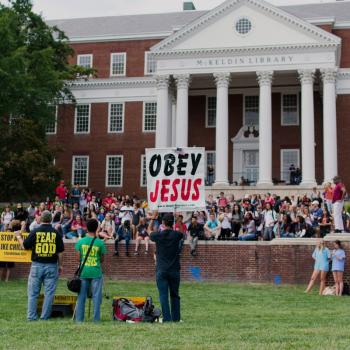Daniel McCarthy thinks that evangelical Protestants are never going to get someone like them in the White House. The reason is that religious conservatism is different from political conservatism:
Before 1988, religious conservatives voted with other conservatives. The religious right wasn’t yet organized in 1964, but “moral” voters were a significant component of Goldwater’s base, sometimes to the candidate’s own embarrassment. (He vetoed the distribution a short film, “Choice,” intended by his supporters to rally voters with alarming images of race, sex, and crime.) Reagan in 1980 was the first Republican hopeful, and then nominee, to benefit from effectively organized social-conservative groups like the Moral Majority. thisarticleappears copy
The development of the religious right or social conservatives as a bloc discrete from conservatives generally proved to be the undoing of the right in Republican presidential primaries. But this differentiation into two distinct strands of conservatism, represented most of the time by competing avatars in GOP primaries, was not the result of hubris or short-sightedness on the part of religious conservatives. On the contrary, it represents a real philosophical divide that can be seen in the different emphases, attitudes, and even positions taken by social-conservative champions vis-à-vis other conservatives.
That different attitude and emphasis may be precisely what is on view with Kim Davis, the latest icon in the culture wars. Davis apparently understands her faith in such a way that it will not let her carry out common or public activities like signing a marriage certificate without her faith being at stake. For evangelicals like Davis (if she is representative), the claims of Christ on the believer are total. No square inch of epidermis or tissue escapes Christ’s rule.
But that was not the way the first Christians were known. Could the fellow who wrote the letter to Diognetus have written this if he were surrounded by Kim Davises?
Christians are indistinguishable from other men either by nationality, language or customs. They do not inhabit separate cities of their own, or speak a strange dialect, or follow some outlandish way of life. Their teaching is not based upon reveries inspired by the curiosity of men. Unlike some other people, they champion no purely human doctrine. With regard to dress, food and manner of life in general, they follow the customs of whatever city they happen to be living in, whether it is Greek or foreign.
And yet there is something extraordinary about their lives. They live in their own countries as though they were only passing through. They play their full role as citizens, but labor under all the disabilities of aliens. Any country can be their homeland, but for them their homeland, wherever it may be, is a foreign country. Like others, they marry and have children, but they do not expose them. They share their meals, but not their wives.












